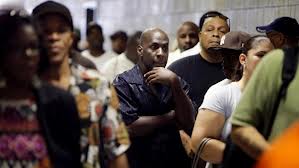
By James Clingman
(NNPA) It has always been intriguing to me that we have elected thousands of Black politicians since Reconstruction, especially since 1970, while the number of Black economic advocates pales in comparison. Understanding that Black economic advocates are not elected per se, it makes sense to me that if economics is at the bottom of everything in this country, Black people should have at least as many Black economists, economic advocates, and economic literacy instructors as we do politicians.
Marcus Garvey said, “The most important area for the exercise of independent effort is economic. After a people have established successfully a firm industrial foundation they naturally turn to politics and society, but not first to society and politics, because the two latter cannot exist without the former.” Obviously we should have listened to and followed Garvey’s advice; he was one of our most powerful and committed economic advocates.
There were many others who attempted to school us on the importance of economic empowerment, folks such as Maria Stewart, William Wells-Brown, T. Thomas Fortune, Booker T. Washington, W.E.B. DuBois, and Mary McLeod Bethune. Today, we few who are striving to do the same. But are we listening to them and following their advice?
We would much rather listen – and that’s all we do – to the empty rhetoric of political hacks and rely on our emotions rather than our intellect to make decisions about the direction we will take vis-à-vis our votes. We also fail to properly align our priorities, as Garvey suggested, in an effort to achieve true economic freedom.
Our present condition, both economic and political, is dire. Unfortunately, we are being led to believe that politics is the answer and that some politician will solve our issues for us. Even worse is the fact that some of us truly believe that nonsense.
My local newspaper, the Cincinnati Enquirer, featured a story that questioned why no Blacks were running for mayor this year. The piece cited the fact that Black people comprise nearly 50 percent of this city’s population, and although we have had a Black mayor for nearly eight years, the paper posed the question and slanted the story as though it was truly disheartened at the lack of a Black candidate this time. Let that marinate a little while.
Since when has anyone other than Black folks been concerned about the absence of Black political candidates in any race? We don’t see many stories in dominant media dealing with the dearth of Black ownership of major corporations, the overwhelming number of Black owned businesses that have only one employee, or the disparities of the prison industrial complex. So why this concern in politics? Could it be that Black politics is viewed as nonthreatening, while Black economics is viewed just the opposite? Could it be that Black politics is full of emotion and symbolism, while Black economics is pragmatic and substantive in nature?
Is economic empowerment threatening? The following quote from George Meany, AFL-CIO president, in 1969, might answer that question for us. “At its worst, ‘black capitalism’ is a dangerous, divisive delusion – offered as a panacea by extremists, both black and white…Attempts to build economic enclaves with substantial federal tax subsidies within specific geographically limited ghetto areas is apartheid, anti-democratic nonsense.”
Had enough yet? It’s easy to see that Black people in 2013 are used and misused by the political system. All of you emotionally engaged political devotees please sit down for this next statement. It matters not what “color” a politician is, even the color of the person who resides in the White House. Black folks had better get that through our thick heads and start pursuing an economic agenda, first, as Garvey said, and then a political one. Believe me, when a group’s economics is in order, their politics will fall in line accordingly.
For the life of me I cannot fathom why Black folks in this country, after all that we have seen and experienced, are still waiting on politics to save us. And it’s hard to understand why we think Black politicians will do right by Black people, simply because of their skin color. To make matters worse, we are still trying to figure out “Who is Black in America?” despite the so-called “one drop” rule, which was made up by White people. He who defines you controls you. (By the way, wouldn’t the “one drop” rule make everyone in the world Black, since mankind started in Africa? Just a thought.) Being Black is not as much about skin color as it is about consciousness.
Economics is about empowerment, and our dollars should be used more wisely to that end. Politics is about self-interest, and our votes should reflect that truth. White politicians can help Black people just like Black politicians can. The same applies for White and Black capitalists. The question is, “Will they?”
The best help is self-help, however. We must organize and rally around basic economic principles. And until we are really serious about playing the politics game, we must wean ourselves off the milk and pabulum of political dependence, and get on a steady diet of cooperative economics and mutual support.
Jim Clingman, founder of the Greater Cincinnati African American Chamber of Commerce, is the nation’s most prolific writer on economic empowerment for Black people. He is an adjunct professor at the University of Cincinnati and can be reached through his Web site, blackonomics.com.




